
by Staff
Yesterday, Nicolas Maduro was sworn in as the President-elect of Venezuela and will begin his new term in January of 2019. Maduro was the likely successor of Hugo Chavez after he passed away in 2013. It comes at no surprise that fellow strongmen Xi Jinping of China and Kim Jong Un of North Korea swiftly issued their congratulations to Maduro who won his election with nearly 70% of the vote, his closest competitor received 21%.
Democracy activists in Venezuela and international bodies, including the US State Department, have concluded that the election was a fraud and refuse to acknowledge Maduro as the head of state. The only countries that seem comfortable recognizing Maduro’s victory are the usual suspects: Cuba, Syria, Iran and Turkey to name a few. Voter turnout hovered around 45% and two of Maduro’s main opposition leaders were outlawed from participating in the election.
Despite hyper-inflation, massive food shortages, protests, violence and arrests, Maduro exclaimed on Sunday after ‘winning’ reelection, “How they underestimated me, but here we are, triumphant!”
Though Venezuela’s problems aren’t directly rooted in this pompous pariah’s quest for power, he’s no stranger to the political throne. He first worked as a humble bus driver, but rapidly climbed the political ladder once elected to the Venezuelan Congress. Maduro became the country’s Finance Minister in 2006. He followed that up by being elected Vice President under Hugo Chavez, then assumed total authority upon Chavez’s death.
Chavez had led a coup d’état in 1992 in which he ousted then-President Carlos Andres Perez. Seven years later a referendum was held nationwide to rewrite the Venezuelan constitution; and this change did include presidential term limits. The new constitution passed but before the term limits could impact Chavez, he spearheaded a change to abolish the very term limits that were designed to constrain him in 2009.
After Maduro assumed power, the opposing political parties won a majority of seats in the national legislature. Jealous by nature, Maduro then moved to disassemble the legislature entirely and create a new one via referendum. Imagine an American president attempting to abolish Congress – the outrage would be deafening. But in Venezuela, due to the lack of term limits, citizens have become accustomed to political corruption, riots and protests.
What can’t be determined is whether any good, fundamental change will take place in the near future. Maduro has sworn up and down that his number one goal is to recover from the economic catastrophe plaguing the once prosperous nation, but hopes seem dim. No talk of term limits is on the horizon and though it seems nearly impossible for the president to hold onto power due to the calamity enveloping Venezuela, he remains firm in his dedication to staying in office, marching onward to a destination known only to madmen.
Staff is a Staff Member of U.S. Term Limits, based in South Florida. Follow us on Twitter!